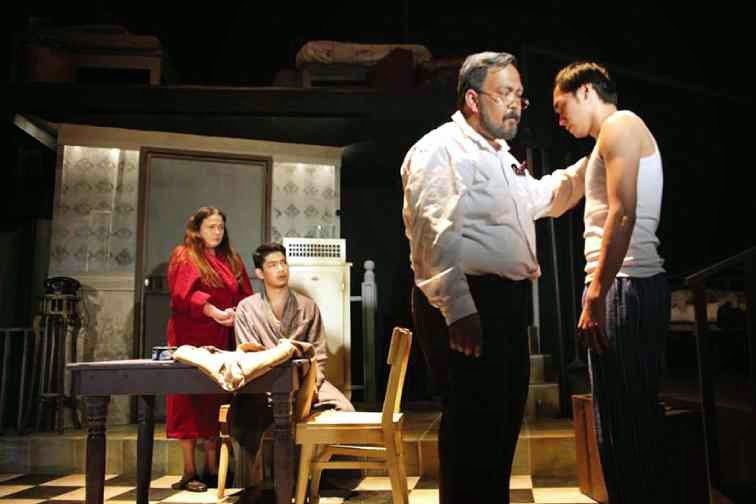"I looked up and saw the sky…and realized
what a ridiculous lie my whole life had been."
Just came back from watching the translated version of Arthur Miller's Death of A Salesman at the CCP.
I'd read the Pulitzer Prize-winning play at one point in college, but never actually saw a performance. What a difference, indeed, when words on paper are translated into speech and action.
Dramatic, you might even say.
I'll leave the in-depth analyses to bona fide theater critics, and simply stick to my reactions as an audience member. Being seated in the front row - a worthy payoff to showing up early to be first in line, since Tanghalang Huseng Batute is free seating - gives the play an urgency and an intimacy that you simply cannot have in the back rows or the bleachers. Every facial expression, every inflection, every drop of spittle spewing in the heat of the dramatic moment is literally right there in front of your face.
Having the characters actively brought to life, instead of passively lying on the printed page, gave Pahimakas Sa Isang Ahente (the working title they gave this Tinio translation) a raw power and energy that I did not experience the first time I encountered Miller's opus. The impassioned love-resentment tango between Willy Loman and his favorite son, Biff; the failures and shortcomings of all the members of the Loman family; and the aching sadness and helpless frustration of realizing that one's life can amount to so little in terms of legacy hit a little too close to home.
More than once, I saw my father and myself in Willy and Biff, and my ongoing love/anger relationship with him gets mixed with a drop of insight into how frustrated he must be at his unwanted and unplanned retirement; his unspoken aspirations for me (unlike Loman's very strident ambitions for his son); and whether the sum total of his life achievements tally with his own personal calculations, and how much - or how little - discrepancy there is in the balance sheet.
When Biff grabs his father in a pleading, desperate embrace in the middle of a furious, drawn-out fight near the climax, it was really, really too close to home.
No, scratch that.
It was a direct hit.
I almost, almost wept, memories of an almost exact scene my own father and I played out in real life years ago rising like a geyser of emotion.
Goddamn, I don't get that kind of poignancy from a telenovela, although the essence of Miller's play is human frailty leading to a family tragedy - something that's squarely in the wheelhouse of any dramatic serye.
I suppose it's this universality, coupled with Tinio's translation - while imperfect - that makes the play more accessible.( He could've easily changed the locations and the currency to local Filipino ones without losing anything of substance, but these are minor quibbles.) Indeed, while the audience (largely composed of high schoolers, undoubtedly and literally on assignment) tended to laugh at crucial, inopportune moments (I don't recall the play having much levity), the sniffles came loud and clear when Willy Loman's ultimate fate dawned upon them. (A denouement cannily sidestepped by the Tagalog title; pahimakas is not a word familiar to even I, and it was my dinner companion - an older female colleague - who illuminated me on its meaning: a romantic term for goodbye .)
Pamamaalam, in short.
Although I am more partial to its other meaning: testament.
tes·ta·mentˈtestəmənt/
For indeed, Miller's play is a testament to the paltry sum of a man's lifelong labors, the evidence that is lacking in terms of its meaning, its monumental tragedy. It is also something we, the audience, bear witness to.
If Miller's words are moving in and of themselves, it is the actors who give his play its raw life force. The members of CCP's resident Tanghalang Pilipino troupe, led by the explosive 29(!!!)-year old Jonathan Tadioan (alternating with the more age-appropriate Nanding Josef) as the Loman patriarch, and ably supported by Raquel Pareño (alternating with mom Gina) as Linda, his loving, loyal wife; Marco Viaña (alternating with Yul Servo) as Biff, the eldest, favored son; and Ricardo Magno as Happy, the younger Loman, breathe passionate, angry, flailing life to the Greek tragedy of the Loman family.
A universal tale so enduring that the relevance of the Tony Award-winning 1949 play resonates with such cruel clarity to this day.
=====================
P.S.
Full disclosure.
I had casually wanted to see this play because of a running joke about going to see Yul Servo (the other, more well-known actor essaying Biff) up close and personal, but I'm crushing on tonight's alternate, Marco Viaña. Which comes as a surprise to me because 1.) I haven't crushed on anyone for a loooooong time; 2.) I don't normally go for skinny, maputi guys (hence the thing for Yul "The Brown Animal" Servo).
But who can figure out these things? I think I got sold when Viaña (who strikes me now as a young Tommy Abuel) started weeping at a key point in the play. Weakness usually incites predatory instincts instead of pity in me, and yet, seeing him trembling in betrayed anger, looking so innocent and vulnerable, just made me want to go over and hug him (and maybe cop a feel or two.)
I just want what's best for you.
And maybe I wasn't the only sucker for vulnerability in an angry young man, if the shrieks of the girls as Viaña came out for curtain call was any indication.
It was like the sound of a thousand vaginas screaming.
Never thought Miller time could be thriller time.
=====================
You can still catch Pahimakas Sa Isang Ahente on Oct. 18, Sat. and Oct. 19, Sun. at 3 pm.



